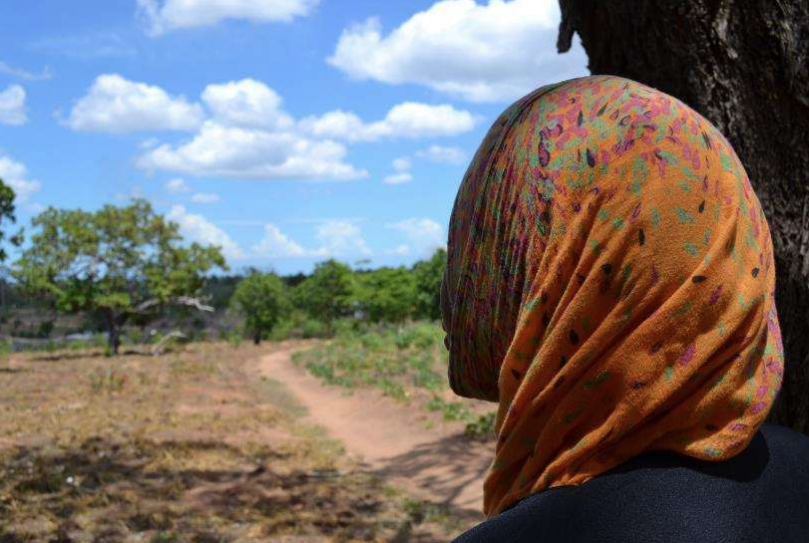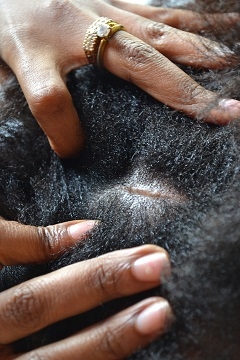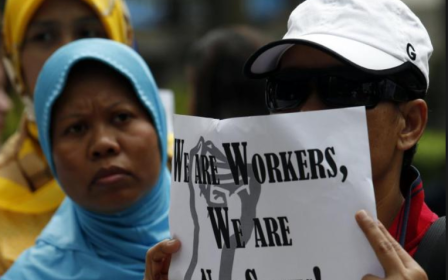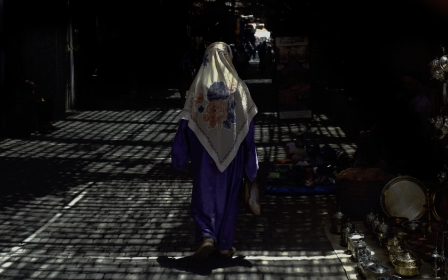'I just want to go home': Tanzanian women describe abuse in Oman and UAE

Basma first tried to leave Oman when her employer beat her up. Bruised and battered both mentally and physically, she was desperate to leave and went to the Tanzanian embassy for help.
But with her passport taken away from her, and the embassy unable to do anything, the 21-year-old was left stranded.
Unable to flee, she continued to work 21 to 23 hours a day, and was banned from leaving the house, unless it involved taking out the rubbish.
A month later, while she was cleaning the top of a cupboard, her employer's son turned on a ceiling fan.
After a blade from the fan hit her head, Basma fell to the ground. She held down her wound as blood flowed from her head, and fled to the Tanzanian embassy.
But leaving came at a price. Basma was left with a deep scar on her head, sealed together with six stitches, and a mountain of debt.
Basma's employers refused to let her go unless she paid back $6,000. This was the fee charged to her employer by an agent for bringing her to Oman, which they demanded Basma's family repay for her to go free.
"I told them...my family never received this money, (but) my employers said: I don't care, that's what I gave your agent...I want my money back," said Basma.
"I just said I want to go back home."
She then went to air her concerns to a dispute-resolution process, but the Omani government official tasked with mediating her case told Basma's employer to report her to the police if she refused to pay the recruitment costs for her replacement.
Frustrated with the situation, Basma gave up three months of her salary and paid for her own flights back home using the money she had borrowed from a Tanzanian embassy official.
She was still paying off her loan a year after returning home in February 2016.
Basma is one of 50 women who spoke to Human Rights Watch about the conditions for Tanzanian women who work in Oman and the UAE.
Their stories were included in a new report by HRW which looks into the recruitment process and lack of protections given to Tanzanian women who work in the Gulf from their embassies and the Emirati and Omani authorities.
The women interviewed for the report ranged between the ages of 20 and 46 with the majority coming from Zanzibar in Tanzania.
Sexual harrassment
East Africa has become the new frontline for domestic workers who are being sent to the Gulf, as they are cheaper to hire and have fewer protections, in comparison to workers from South Asia.
The report includes harrowing details of Tanzanian women who have been subject to sexual and racial abuse from their employers and recruitment agents tasked with finding workers in East Africa.
Rothna Begum, a researcher for Human Rights Watch who authored the report, told Middle East Eye, that unlike other instances of abuse towards domestic workers in the Gulf, Tanzanian women of all ages faced higher rates of sexual harassment.
"Many Tanzanian domestic workers described egregious working conditions. Almost all said passports were confiscated. Many had been racially and physically abused. Women talked about being groped, with one woman being anally raped," Begum told MEE.
"Tanzanian domestic workers are facing serious abuse in Oman and the UAE. But their government is failing to adequately protect them from the abuse that they face, whether it's before they leave, after they arrive in the country of employment or upon their return."
The report highlighted how the lack of protections for Tanzanian workers had led to rampant human rights abuses across the board.
Racial abuse
Begum also told MEE that the abuse faced by most of the Tanzanian workers took on a racial dimension as their employers treated them differently and at times described them as "dogs".
"Some of the workers being insulted and shouted at. It took on a racial element where employers would say that they are domestic workers because they are African, said Begum.
"Some workers described the level of racial discrimination [of their employers] because they wouldn't touch the same plate as them or eat the same food."
Tanzania requires workers to process their migration applications through the country's labour ministries, but many workers left to work in the Gulf outside of this channel.
The authorities require women to migrate through a recruitment agency but have not set out minimum standards for how agencies assist workers in cases of abuse, or for inspections and penalties in case of violations.
Despite Tanzanian labour laws prohibiting agencies from charging fees and costs to workers, many women told HRW that agents charged them anyway.
Oman and the UAE exclude domestic workers from their labour laws. Omani authorities issued new domestic worker regulations in 2004 but they have proven to be weak, with no penalties for employer breaches.
In September 2017, the UAE issued a law providing domestic workers with labour rights for the first time, but the new law offered lesser protections than for workers under the general labour law.
The Kafala system remains the largest impediment to domestic worker's rights in Oman and the UAE, and should be ended, Human Rights Watch said. Under the system, domestic workers cannot change employers without their initial employer's consent, and those who flee can be charged with "absconding".
This article is available in French on Middle East Eye French edition.
Middle East Eye propose une couverture et une analyse indépendantes et incomparables du Moyen-Orient, de l’Afrique du Nord et d’autres régions du monde. Pour en savoir plus sur la reprise de ce contenu et les frais qui s’appliquent, veuillez remplir ce formulaire [en anglais]. Pour en savoir plus sur MEE, cliquez ici [en anglais].





